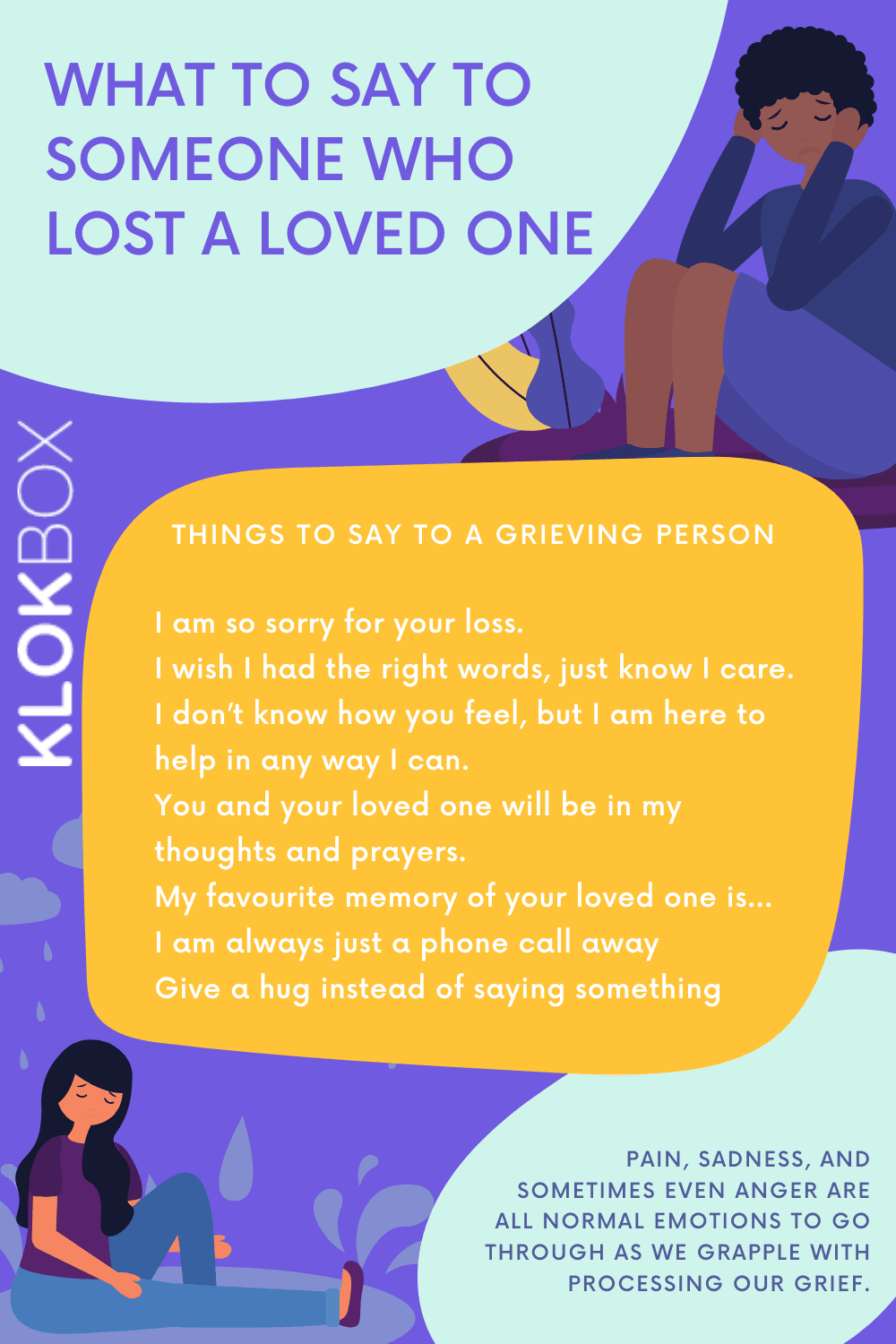Unfortunately, we all know the feeling of loss when someone we love dies. Pain, sadness, and sometimes even anger are all normal emotions to go through as we grapple with processing our grief. It can be hard to understand what it’s like for people who have lost loved ones and don’t know how to help them cope. If you want to support a friend or family member going through this difficult time in their lives, it’s important that you learn some tips on how best to communicate your sympathy without adding additional burden onto their healing process. In this blog post, I will talk about what words of comfort can help someone going through the grieving process feel supported by those around them during such a tough transition. Before we go through the
- Grieving is a natural process and everyone deals with it in their own way
- There is no right or wrong way to grieve, just as there is no right or wrong time to do so
- Allow the person space and time to grieve in their own way, and don’t push them to talk about the loss if they’re not ready
- Offer practical support – help with funeral arrangements, cleaning up around the house, cooking meals, etc.
- Let the person know that you’re there for them, whenever they need someone to talk to
- Don’t forget about your own needs – take care of yourself and allow yourself time to mourn too

Key Takeaways
What To Say To Someone Who Is Grieving?
Words are inadequate for expressing your compassion in the face of another’s grief. But you can still show support with a simple gesture like ‘I’m so sorry’ or ‘you’re on my mind’. To avoid causing further pain, never tell someone that their loss was for the best and try not to compare it to others because no one knows how each individual feels at such times better than themselves. Offer comfort but remember that silence speaks volumes too sometimes – just being by their side is enough.
Whether there’s someone who lost a loved one, a grieving friend, or a closed loved one, you need to know what to say to them to make them feel understood and comforted. Here are 10
- I am so sorry for your loss
- I wish I had the right words, just know I care
- I don’t know how you feel, but I am here to help in any way I can.
- You and your loved one will be in my thoughts and prayers.
- My favourite memory of your loved one is…
- I am always just a phone call away
- Give a hug instead of saying something
- We all need help at times like this, I am here for you
- I am usually up early/late, if you need anything
- Saying nothing, just be with the person
When someone is going through a bereavement, you may want to take their pain away. Knowing what to say when someone is grieving can be difficult. You may feel helpless and want to take their pain away, but unfortunately, this isn’t possible. What you can do is validate their experience by saying something like, “I’m sorry I can’t make things better”, “I’m sorry it’s so hard for you”, or “I’m sorry things are so tough right now”. This lets them know that you see how much they’re struggling and that you care about their well-being. If you’re not sure what to say, start with these phrases and go from there.

The Worst Things to Say to Someone in Grief
When someone is going through a bereavement, you might not want to say the wrong things. Avoid saying things like “I know how you feel”, etc. Here are 10 wrong
- At least she lived a long life, many people die young
- He is in a better place
- She brought this on herself
- There is a reason for everything
- Aren’t you over him yet, he has been dead for a while now
- You can have another child still
- She was such a good person
- God wanted her to be with him
- I know how you feel
- She did what she came here to do and it was her time to go
Let’s dive in on what to say to someone who lost a friend or a loved one:
I’m so sorry for your loss
Losing someone you love is never easy. It can be especially hard when you feel like there are no words to express how you feel. In times of grief, it’s important to remember that you don’t need to say the perfect thing – just knowing you care and expressing your condolences can go a long way in helping someone feel supported.
When someone you care about has experienced the loss of a loved one, saying “I’m sorry for your loss” can be a simple but powerful way to show your support. These three little words communicate that you’re there for them, and you recognize the gravity of their loss. It’s a meaningful gesture of empathy and understanding.
Also, let them know if they want to talk, you are always there for the bereaved person.

I can’t imagine how you feel
When someone we love passes away, it can leave us feeling confused, angry, and overwhelmed. We may not even know how to begin to express our sorrow and grief. The death of a loved one is like no other experience, and when someone else is going through it, it can be hard to understand the depths of their pain.
It’s natural for us to want to find the right words to comfort and support our grieving friend or family member, but it’s important to remember that there are no perfect words to take away the hurt. Instead, it’s often the small gestures of kindness that can mean the most.
That being said, when someone you know is grieving loved ones, simply expressing your empathy and understanding can be a great way to show them that you care. Let them know that you understand their pain and sorrow, even if you can’t fully relate to it. Let them know that they don’t have to go through it alone and that you’re here for them whenever they need you.
I’m here for you
It’s important to let them know you’re there for them and let them know that you are willing to listen to and support them. Offer to help – that may mean helping out with tasks, running errands, checking in frequently, or offering a shoulder to cry on. It can also mean just sitting with them in silence. Just being there can be enough.
It’s also important to remember that grief looks different for everyone and is experienced on different levels. Respect their wishes and don’t be pushy about how they should handle their grief. Don’t try to downplay their emotions or talk them out of how they’re feeling. Simply let them know you’re here and available when they’re ready. We can’t take away the pain of loss, but we can provide comfort and strength. Show up and be present. Let the grieving person know that you are here for them.

I’ll be praying for you
Prayer is often seen as a way to reach out and make an intangible connection with someone you care about. It can help you to express your compassion and empathy for their loss in ways that words alone cannot. When you tell someone that you are praying for them, you are showing that person that you care about them and want to be there for them in any way that you can.
Praying for someone who is grieving also helps you to stay connected to them and show them that even though their loved one is no longer physically with them, they are still being thought of and remembered. This can give them a sense of peace during a time of intense grief.
I wish I had the right words, but sometimes there are none
Grief can be a heavy and difficult emotion to grapple with. It can be hard to find the words to express what you feel when someone you love has passed away. You may feel that there’s nothing you can say to ease the pain, but it is important to try. Even though there may not be the right words, expressing your sympathy and compassion can help comfort someone who is grieving.
It is understandable to feel stuck and unable to provide solace in this situation. After all, the loss of a loved one is heartbreaking and immense. Showing up, even when you don’t know what to say, is enough. Being present is often more valuable than any words you could speak. Sometimes just being there and offering a hug is the best thing you can do.

I’m always here if you need to talk
It can be hard to find what to say to a grieving person. But one of the best things you can do for a loved one is to simply be there and listen. Let them know that they can talk to you whenever they need. Offer to lend an ear, without judgment, and be willing to listen to whatever they want to share. They might just need someone who will listen without trying to fix the situation or offer unsolicited advice. Let them know that you are available and that you care enough to listen. Just being there for them and offering your support can make all the difference.
I don’t know how you do it
Show your support and let them know that you are there for them in whatever capacity they need. Help them find comfort after the death of their loved one. Let them know that you see their strength and admiration and that you don’t take their courage for granted. Offer kind words of comfort and understanding, and let them know that you appreciate their resilience in the face of such tragedy.
Your friend may never be able to explain how they do it, but it’s important to remember that it’s not a sign of weakness or failure if they can’t find the words. All they need to know is that you recognize their strength and courage, and you are there to support them no matter what.

I can’t believe this happened
When someone we love passes away, it can be hard to process the reality of it. Even though we may have known the end was coming, it still feels like a shock when it actually happens. The pain can be so deep that it’s hard to imagine life without them. It’s hard to imagine not being able to see or talk to them again, and all the hopes and dreams you had for them left unfulfilled. You may find yourself in a state of disbelief, unable to accept that they are really gone.
It is completely normal to feel this way and have difficulty accepting the situation. No one should ever feel ashamed of their feelings, no matter how they express them. It is important to take time to grieve and process all of the emotions that come up. Talk to someone close to you and let them know how you are feeling. Talking to someone can be extremely helpful and can help you to move through your grief in a healthy way.
I will never forget (insert name of loved one)
When someone you love passes away, it can be incredibly difficult to cope with the grief and pain. Memories of that person become even more precious. It’s important to honour their memory by never forgetting the impact they had on your life. One way to remember your loved ones is to talk about them and share memories with friends and family. You can also keep their photos in a visible place in your home. Looking at these memories and reminiscing can bring comfort and a sense of peace.
Finally, you can use the holidays as an opportunity to commemorate your loved one. On special occasions like birthdays and anniversaries, do something meaningful to honour their life, like visiting their grave, lighting a candle for them, or raising a toast in their memory. No matter how much time has passed, never forget the person you lost. Cherish their memories and all the special moments you shared with them. Honour their legacy and remember that they are always with you in spirit.

Supporting Someone Over Time
Nothing can truly prepare you for the deep and abiding sorrow that comes with loss, even if it is something you have expected. After the initial shock fades away, days pass as life goes on – but often the immense pain hits much later when seemingly mundane tasks become overwhelming burdens. Understandably then, more distant support may lessen in intensity over time; luckily there are still ways to show your care during this difficult period! Just remember: no gesture of kindness or compassion ever goes unnoticed by those going through such a hard trial – so keep reaching out from wherever you are!
- make specific offers of help such as cooking dinner, cutting the grass, or going for a walk – the grieving person may find it hard to ask for help
- ask them how you can help – do not assume that they are “over it” or they have enough help
- talk about the person who has died – avoiding the subject does not keep grief away
- give them space to make their own decisions – do not offer advice on how they should feel, act or get on with their lives
- try to remember special occasions like birthdays and anniversaries
- let them know how they can reach out for help – for example, video calls or online support, they may be unsure about what they can ask for
Grieving can be incredibly hard for the bereaved friend or family member. Help your family and loved ones know that they have all the support they need. Help them feel comforted, supported, and loved. Find the right
If you’re not sure what to do or say, it’s okay to just be there for the person who is grieving. Sometimes, just being present can be a big help. Remember that everyone grieves differently and there is no right or wrong way to do it. Offer support when you can but don’t feel offended if the person refuses your help or prefers to get help from someone else.


